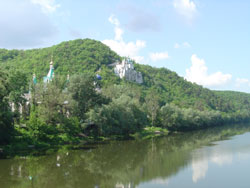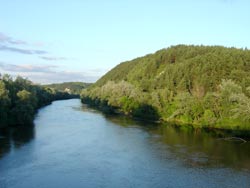The History Of Svyatogorsk
The history of the resort Svyatogorsk
The city of Svyatogorsk, known climatic health resort of Donbass, lying on the picturesque banks of the Seversky Donets. It is famous for wonderful nature and unique historical and architectural heritage bearing the stamp of antiquity, the middle ages, the memory of the revolutionary storms and the great Patriotic war.The extraordinary nature of Svyatogorsk admired by many Russian and Ukrainian writers, artists and composers who were here at the time.Anton Pavlovich Chekhov admired the extraordinary beauty of this area, calling it "Donetsk Switzerland". He wrote to his sister Maria Pavlovna:
He wrote to his sister Maria Pavlovna:
"The place is unusually beautiful and original: a monastery on the Bank of the Donets at the foot of the huge white rocks, where, crowding and looming over each other, piled gardens, oaks and pines. It seems that the trees closely on the rock and that some force sticks them up and up the Pine trees literally hanging in the air, and look, will fall... the Seversky Donets river, chalk mountains,
Cuckoos and nightingales are not silent neither day not night."
The great artist Ilya Efimovich Repin was born and raised on the Bottom, left a lot of landscapes, glorifying the expanse of the ancient river. The Seversky Donets river has long attracted people. Meadows, rich in wild game of the forest, the abundance of fish in the river have created favorable conditions for the settlement of these places. Numerous archaeological findings make it possible to determine that the first inhabitants in the bend of the Seversky Donets appeared in the stone age.Presumably in the middle of the XIII century on the right Bank of the Donets was founded a monastery which served as a refuge for the monks, and shelter in case of enemy attack.About the area, where the city of Svyatogorsk is first mentioned in the notes of the German diplomat S. Herberstein in 1526. Russian Chronicles of the XVI century have noted the role of the Holy Mountains, as a sentry point on the southern outskirts of the Russian state. Russian tsars saw and appreciated the merits of the Svyatogorsk monastery. The state endowed the monastery with lands and lands.In 1774. the property of the monastery was about 2,000 serfs, more than 27 thousand acres of land. The monastery flourished.At the end of the EIGHTEENTH century, during the reign of Catherine II, was carried out the secularization of monastic and Church lands, with the aim of strengthening the political role of the nobility and its financial support. Among these monasteries was and Svyatogorsky monastery. In 1787. the property was described and it was assigned to guard. Monks expelled from the monastery, and the property came into the Treasury. The wealth belonging to the monastery, a long time did not give rest to the nobility. The first who imposed on them, was Prince Potemkin-Tauride. Making trips to the Black sea, Potemkin repeatedly visited the Svyatogorsk. He took a fancy to this picturesque area, which by that time became subordinate to the Treasury. Here he saw"the blue sky of the South and Senno-deciduous trees of Ukraine", and beneath the majestic views. Potemkin, who considered himself the conqueror of the Crimea, using the right favorite and minion of Catherine II, asked the Empress to give him Svyatogorsk"dacha" and "grove".Herded here by serf-masters, he is one of the chalky mountains, located on the right Bank of the Seversky Donets, in the shortest possible time built a luxurious Palace and ordered to build on a beautiful lake baths for their distinguished guests. These baths in those days were called baths. Hence the lake and the village, established on its Bank, called"Bath".In tsarist times, the resort was very popular among wealthy landowners and merchants. In the dense pine forest was built comfortable and luxury cottages, built housing with verandas for games and amusements,in the count's Park in the evenings, a brass band played.
In 1964 the village was renamed Bath in Svyatogorsk.
 The Severskiy Donets river, chalk mountains.
The Severskiy Donets river, chalk mountains.
— diseases of the cardiovascular system,
— functional disorders of the nervous system,
— chronic nonspecific respiratory diseases,
— iron deficiency anemia
— comorbidities. Microclimate provides a truly beneficial effect on the human body: improves metabolic processes, increases resistance to colds, strengthens the body as a whole.







 en
en  ru
ru  uk
uk 
